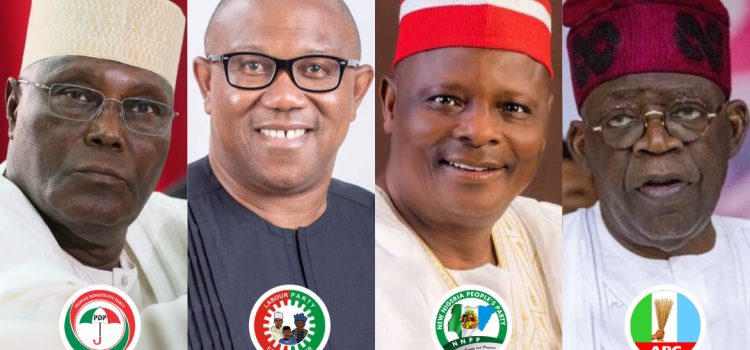The elections are still six months away, which is almost an eternity in a complicated and evolving political campaign.
I think everyone agrees the 2023 presidential election is shaping up to be a four-candidate contest between Asiwaju Bola Tinubu (APC), Alhaji Atiku Abubakar (PDP), Mr Peter Obi (Labour Party) and Dr Rabiu Musa Kwankwaso of the New Nigeria Peoples Party (NNPP). The remaining questions are whether the contest will eventually shape out to be a de facto two-party race (APC versus PDP) as initially appeared inevitable or if Peter Obi can sustain his current momentum and turn this into a three-horse race?
I have previously taken the position that Kwankwaso’s NNPP may be (de facto) contesting a few governorships and legislative seats around the North-West even though in this election cycle, the dynamics of the race may change rapidly depending on geo-regional factors. Nevertheless, Kwankwaso is reported to have said that if he were to choose a candidate other than himself, it would be Tinubu. Since going by current trends, it is difficult to project Kwankwaso being a viable contender for first place, it may be safe to conclude that he may be in Tinubu’s corner for the presidency.
On the other hand, the scheduling of elections makes such electoral permutations difficult and risky for the candidates and their parties. The presidential election is slated to come up first on February 25 2023, along with the National Assembly (Senate and House of Representatives) polls followed two weeks later on March 11 2023 by the Governorship and State House of Assembly elections. Any candidates attempting to “strategically donate” votes to other candidates for the presidential vote may end up endangering their party’s performance in the National Assembly elections holding concurrently and the subsequent state elections. It will be interesting to see how these trade-offs are handled as the campaigns and elections draw closer.
Asiwaju Bola Tinubu can be presumed to have the advantage-his overwhelming victory in the APC primaries; apparent support from the party’s governors especially in the North and South-West; a strong campaign war chest; his wide national network of relationships and political IOUs; and he appears to be steadily uniting the party behind him. His candidacy lost some momentum with the “Muslim-Muslim” ticket controversy, but it may seem like things are gradually settling down. He has shown some sensitivity by selecting Governor Simon Lalong of Plateau State as Director-General of his campaign, but I believe more will be required. I would for instance, support a minimum understanding that cedes the No. 3 and 4 positions (Senate Presidency and Speaker of House of Representatives) to Christians as compensation for the top two positions going to Muslims.
Tinubu has suffered some brand erosion especially online, on account of his perceived certificate and health issues, notably with the dramatic de-branding of “Emilokan” by the viral Pyrates Confraternity song but the damage is not irreversible and is mostly restricted to certain demographics. Tinubu also clearly needs an outreach to Nigeria’s angry youths, especially from the South-South and South-East; with the distemper also beginning to penetrate the South-West. Tinubu’s biggest strategic challenge however is how to take the advantages of ruling party incumbency without assuming the baggage of Buhari’s below-par performance!
Atiku Abubakar has not been allowed to settle down into a campaign posture due to the unending controversy coming from Rivers State Governor Nyesom Ezenwo Wike. It is clear to me that Atiku and many of those close to him continue to underrate Wike’s capacity for disruption and damage. Whatever you say or think of Wike, some equity is on his side-he has invested in PDP more than anyone else since 2015 and he can justly claim treachery and betrayal especially from Sokoto State Governor Aminu Waziri Tambuwal. House of Representatives Speaker Femi Gbajabiamila will of course provide corroboration of the case against Tambuwal! Wike is energetic, highly resourced, aggressive and unconventional. Atiku has nothing to gain by engaging in an unceasing fight with him and will be best served by resolving issues with Wike and his formidable support base within the PDP to enable him put his campaign on a strong campaign footing.
It is obvious that Peter Obi has been the revelation of this process. Many Nigerians, especially the youth are frustrated with “establishment” politicians and the country’s current direction and Peter Obi’s has managed to connect with their popular disaffection. It remains to be seen if the zeal for his candidacy would endure into February 2023 and whether he can translate the current enthusiasm into a viable electoral machine? He seems to be shut out of most of the North-West and North-East zones and Northern Christians may yet vote for the PDP (and in some cases APC) they know, rather than an incipient Labour Party? I believe Tinubu will always be formidable in the South-West. Nevertheless, Peter Obi’s support is growing, and his “movement” is organic and well-motivated.
With the Independent National Electoral Commission releasing final voter registration data, our analysts at RTC Advisory Services and Stairways Communications and Advocacy have started crunching numbers and making tentative projections. We believe the votes will be relatively close between the two leading candidates and no candidate can afford to dismiss any constituencies. We expect turnout at the very least to return to or surpass 2015 percentages and we see a third candidate still a distance away but growing! The good, or not so good news for all four major candidates is that the elections are still six months away, which is almost an eternity in a complicated and evolving political campaign.

